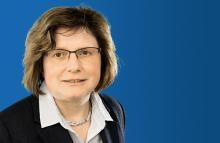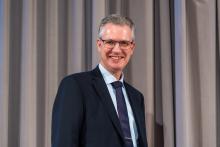Members of the Rectorate
The Rectorate represents the Technische Universität Bergakademie Freiberg externally. In addition to the Rector, the Rectorate includes a Chancellor and three part-time Vice-Rectors.

Rector
Prof Dr Jutta Emes
Akademiestrasse 6, Room 1.11
+49 3731 39-2550
rektorin [at] zuv [dot] tu-freiberg [dot] de (Rektorin[at]zuv[dot]tu-freiberg[dot]de)

Chancellor
Mr Jens Then
Akademiestrasse 6, Room 1.13
+49 3731 39-2700
Kanzler [at] zuv [dot] tu-freiberg [dot] de (Kanzler[at]zuv[dot]tu-freiberg[dot]de)

Vice-Rector for Teaching, Studies and Lifelong Learning
Ms Prof Dr Swanhild Bernstein
Akademiestraße 6, Room 1.06
+49 3731 39-2573
Prorektor-Bildung [at] zuv [dot] tu-freiberg [dot] de (Prorektor-Bildung[at]zuv[dot]tu-freiberg[dot]de)

Vice-Rector for Research and Transfer
Prof. Dr. Martin Bertau
Akademiestrasse 6, Room 1.04
+49 3731 39-2552
Prorektor-Forschung [at] zuv [dot] tu-freiberg [dot] de (Prorektor-Forschung[at]zuv[dot]tu-freiberg[dot]de)

Vice Rector for Sustainability and Entrepreneurship
Prof. Dr Karina Sopp
Schlossplatz 1, Room 2.206
+49 3731 39 2734
Prorektor-Nachhaltigkeit [at] zuv [dot] tu-freiberg [dot] de (Prorektor-Nachhaltigkeit[at]zuv[dot]tu-freiberg[dot]de)
Authorised representative of the Rectorate
The authorisation underlines the university management's long-term commitment to assigning particularly high implementation priority and development potential to the respective subject areas. To ensure optimal realisation, responsibility and decision-making powers are transferred to the authorised representatives and close coordination takes place with the Rectorate. There is currently one authorised representative of the Rector for the topics of the Virtual Faculty.

Authorised representative for TUBAFdigital
Prof. Dr.-Ing. Urs Peuker
Prüferstraße 1a
09599 Freiberg
+49 3731 39-3460
CO-VirtuelleFakultaet [at] tu-freiberg [dot] de (CO-VirtuelleFakultaet[at]tu-freiberg[dot]de)

Authorised representative for EURECA-PRO
Prof. Dr.-Ing. Henning Zeidler
Karl-Kegel-Bau, Room 90, Agricolastraße 1
09599 Freiberg
+49 3731 39-3066
henning [dot] zeidler [at] imkf [dot] tu-freiberg [dot] de (henning[dot]zeidler[at]imkf[dot]tu-freiberg[dot]de)

Authorised representative for Equality and equal opportunities
Prof. Dr. Yvonne Joseph
Gustav-Zeuner-Straße 3, Room 314
09599 Freiberg
+49 3731 39-2995
yvonne [dot] joseph [at] esm [dot] tu-freiberg [dot] de (yvonne[dot]joseph[at]esm[dot]tu-freiberg[dot]de)
Commissions of the Rectorate
Rectorate Commission for Research
Tasks
The Commission is responsible for making recommendations to the Rectorate, in particular
- in research-related matters, e.g. regarding research strategy and priorities,
- for priorities when applying for large-scale research equipment,
- for discussions of current and future requirements,
- on fundamental issues of young researchers,
- on doctoral regulations,
- on decisions of a fundamental nature of the Graduate and Research Academy,
- on matters concerning the University Library "Georgius Agricola",
- on matters concerning the University Computer Centre.
Composition
Chairmanship
- Mr Prof. Dr. Tobias Fieback, Vice-Rector for Research, International Affairs and Transfer
Voting members
- The Vice-Rector for Research
- One person nominated by the Dean
- Prof. Aland (Fak. 1)
- Prof. Mertens (Fak. 2)
- Prof. Seifert (Fak. 3)
- Prof. Zeidler (Fak. 4)
- Prof. Joseph (Fak. 5)
- Prof. Czudaj (Fak. 6)
- the Head of the Department of Studies and Research or a representative appointed by him
- the Director of the Graduate and Research Academy
- the Heads of the University Library "Georgius Agricola" and the University Computer Centre or a representative appointed by them
Protocol
- Mr Dr Jens Grigoleit, Vice-Rectorate Research
Rectorate Commission Education
Composition
Chair
- Mrs Prof. Dr. Swanhild Bernstein, Vice-Rector for Teaching, Studies, and Lifelong Learning
Voting members
- Dr. Brause, Christoph Faculty 1
- Prof. Dr. Hielscher, Ralf, Faculty 1
- Bunk, Zoe, Student Representative Council 1
- Störr, Bianca, Faculty 2
- Prof. Dr. Hedrich, Sabrina, Faculty 2
- Kühn, Esha, Student Representative Council 2
- Dr. Roentzsch, Silke, Faculty 3
- Prof. Dr. Meinhold, Guido, Faculty 3
- Zirkler, Jenny, Student Representative Council 3
- Dr. Dög, Andrea, Faculty 4
- Prof Kröger, Matthias Faculty 4
- Sachse, Christoph, Student Representative Council 4
- Dr. Renker, Dirk, Faculty 5
- Prof. Dr. Prahl, Ulrich, Faculty 5
- Weinert, Anton, Student Representative Council 5
- Prof. Dr. Stephan, Johannes, Faculty 6
- Neumann, Andrea, Faculty 6
- Brüssow, Ben, Student Representative Council 6
- Mr Köhler, Gerd, Head of Student and Academic Affairs
Expert Members
- Prof. Dr. Sprungk, Björn, Faculty 1
- Prof. Dr. Jung, Bernhard, Faculty 1
- Prof. Dr. Bertau, Martin, Faculty 2
- Prof. Dr. Plamper, Felix, Faculty 2
- Prof Dr. Wotte, Thomas, Faculty 3
- Prof. Dr. Scheytt, Traugott, Faculty 3
- Prof. Dr. Drebenstedt, Carsten, Faculty 3
- Prof. Dr. Günther, Thomas, Faculty 3
- Prof. Dr. Benndorf, Jörg, Faculty 3
- Prof. Dr. Mischo, Helmut, Faculty 3
- Prof. Dr. Buske, Stefan, Faculty 3
- Prof. Dr. Gerhards, Christian, Faculty 3
- Prof. Dr. Jackisch, Conrad, Faculty 3
- Prof. Dr. Schwarze, Rüdiger, Faculty 4
- Prof. Dr. Eidel, Bernhard, Faculty 4
- Prof. Dr. Fuhrmann, Sindy, Faculty 4
- Prof. Dr. Bräuer, Andreas, Faculty 4
- Prof. Dr. Peuker, Urs, Faculty 4
- Prof. Dr. Zeidler, Henning, Faculty 4
- Prof. Dr. Richter, Andreas, Faculty 4
- Prof. Dr. Leineweber, Andreas, Faculty 5
- Prof. Dr. Joseph, Yvonne, Faculty 5
- Prof. Dr. Olena Volkova, Faculty 5
- Prof. Dr. Rafaja, David, Faculty 5
- Prof. Dr. Stumpf-Wollersheim, Jutta, Faculty 6
- Prof. Dr .Höck, Michael, Faculty 6
- Prof. Dr. Rübbelke, Dirk, Faculty 6
- Prof. Dr. Hauck, Ronny, Faculty 6
- Prof. Dr. Frau, Robert, Faculty 6
- Prof. Dr. Leischnig, Alexander, Faculty 6
- Prof. Dr. Roelevink, Eva, Faculty 6
- Prof. Dr. Felden, Carsten, Faculty 6
- Dr. Sishchuk, Julia, IUZ
- Polanski, Katja, IUZ
- Dr. Meyer, Julia, University Library
- Dr. Wopat, Kristine, GraFA
- Geishecker, Freya, GraFA
- Dr. Schellbach, Department 5
- Böttcher, Helen, Department 5
Minutes
- Preiss, Sylvie
Rectorate Commission for Internationalisation
Tasks
The Commission is responsible for making recommendations to the Rectorate and the relevant structural units, in particular
- Developing the university's internationally oriented programmes in education, research, transfer and continuing education
- Language training and teaching intercultural skills
- Increasing the university's attractiveness for international students and academics
- Supporting international mobility
- , transfer and continuing education
- Language training and the teaching of intercultural skills
- Increasing the attractiveness of the university for international students and scientists
- Supporting international mobility for students and employees of TU Bergakademie Freiberg
- Integrating international students, staff and guests in the university and its environment
- International partnerships and cooperations
- Implementation and continuation of the university's internationalisation strategy
Composition
The commission is chaired by Prof. Dr. Tobias Fieback.
Voting members are:
- Prof. Dr Tobias Fieback, Vice-Rector for Research, International Affairs and Transfer
- Prof. Dr Marcus Waurick, Fac. 1
- Prof. Dr Jens Kortus, Fak. 2
- Prof. Dr Carsten Drebenstedt, Fak. 3
- Prof. Dr Björn Kiefer, Fak. 4
- Prof. Dr Olena Volkova, Fak. 5
- Prof. Dr Karina Sopp, Fak. 6
- Prof. Dr Mohammed Amro, Foreign Student Representative
- Prof. Dr Mohammed Amro, Commissioner for Foreigners
- Katja Polanski, Director IUZ (Languages)
- Ingrid Lange, Director International Office
- Uwe Leutholf, Head of Department, Department of Studies and Research
- Dr. Sabine Schellbach, Head of Department, Department of University Communication
- Katrin Porrmann, Head of Department, Department of Human Resources
- Dr Kristina Wopat, Director of GraFA
- Dr Jens Grigoleit, Head of Research, EU Affairs
- Jones-Owusu Afriyie, Representative of the International Students
- Sen. Students
- Shubham Sharma, Representative of the Student Council
- José Garcia del Real, Representative of the Doctoral Council
- Dr Olaf Hellwig, Representative of the Staff Council
Rectorate Commission on Diversity, Equality and Inclusion
Tasks
Under the leadership of the Rector, the Rectorate Commission for Diversity, Equality and Inclusion represents the various areas of the university (administration, central units, faculties) and thus also the different member groups (students, doctoral candidates, academic staff, university lecturers) of the university.
The committee is responsible for making recommendations to the Rectorate regarding the strategic direction and implementation of equality work, diversity and inclusion, in particular
- for the definition of goals and areas of action,
- for the creation of conceptual foundations,
- for the implementation of measures and the coordination of activities to promote equality and family friendliness as well as inclusion and diversity management,
- to make decisions on the use of the central budget designated for gender equality work,
- to monitor the measures and analyses with regard to the achievement of objectives,
- to promote gender equality and family friendliness throughout the university; Raising awareness, increasing visibility and positive perception.
Composition
Chair
Mrs Prof Dr Jutta Emes, Rector
Voting members
- the Equal Opportunities Officer of the university
- the Equal Opportunities Officers of the individual faculties
- the Equal Opportunities Officers of the central institutions
- one representative of each member group
- a total of four representatives of the central institutions and the university administration
- one member of the QUEERZ working group
Rectorate Commission for Graduate Funding
The Graduate Funding Office is the central decision-making body of the University for all structural issues relating to graduate studies.
In accordance with §§ 42 and 43 SächsHG, the Graduate Funding Office decides in particular on:
- The awarding of scholarships, in particular state graduate scholarships in accordance with the Saxon State Scholarship Ordinance (SächsLStipVO) of 14 February 2001
- The awarding of scholarships to promote re-entry into academic work in accordance with the SMWK guidelines on the awarding of scholarships to promote re-entry into academic work.02.2001
- Awarding of scholarships to promote re-entry into academic work in accordance with the SMWK guidelines on the awarding of scholarships to promote re-entry into academic work (FördRL Wiedereinstieg vom 23.09.2005
- Continuation of funding after expiry of the first funding period of the above scholarships, extension of funding in exceptional cases and revocation of approved funding
- Granting of special grants
In addition, the Graduate Funding Programme maintains close working contact with the Graduate and Research Academy of the TU Bergakademie Freiberg and has a say in structural decisions.
Currently, the Graduate Funding Programme, in which the university lecturers have voting rights in accordance with the law on absolute voting rights, has been established. The current members of the Graduate Support Board, in which university lecturers have an absolute majority of voting rights by law:
Chair
- Prof. Dr Tobias Fieback, Vice-Rector Research, Internationalisation and Transfer
Voting members
- Prof. Dr Oliver Rheinbach, Faculty 1
- Prof. Dr Florian Mertens, Faculty 2
- Prof. Dr Helmut Mischo, Faculty 3
- Prof. Dr Björn Kiefer, Faculty 4
- Prof. Dr Yvonne Joseph, Faculty 5
- Prof. Dr Alexander Leichnig, Faculty 6
- Dipl.Chem. Betty Fuhrmann, representative of the doctoral students
- N.N., representative of the academic staff who have completed their doctorate
as well as in an advisory capacity:
- N.N., Deputy Equal Opportunities Officer
- Dr Kristina Wopat, Director of the Graduate and Research Academy
- Isolde Geißler, representative of the Student Union
Rectorate Commission Budget
Tasks
In accordance with Section 13 of the Rectorate's Rules of Procedure, the Rectorate Budget Commission is responsible for making recommendations to the Rectorate, in particular
- on the funding distribution model and budget allocation,
- on fundamental matters relating to the positions and funds allocated by the budgetary legislator.
The recommendations are made by resolution as a result of a vote. A simple majority of the votes of the members present is required. The Commission meets in private. Consultative, non-voting third parties may be invited to the meetings for certain matters.
Composition
Chair
Mr Jens Then, Chancellor
Voting members
- The deans or their designated representatives
- The heads of the central institutions
- The head of the budget department
- The head of the budget department, Third-party and special funds
- a representative from the Controlling division of the Budget department
In addition, the other members of the Rectorate may participate in the meetings of the Rectorate Budget Commission with voting rights.
Rectorate Commission Consilium decanale
Tasks
The Rectorate Commission Consilium decanale serves as a forum for dialogue and consultation between the deans and the Rectorate of the university. The deans and members of the Rectorate as well as other members of the university appointed by the Rectorate are members with voting rights, whereby the number of deans should not be in the minority.
The Rectorate Commission Consilium decanale meets at least three times each semester. It is chaired by the Rector, who appoints a Dean to chair the meeting. The chair of the meeting rotates every semester in accordance with the order set out in Section 2 of the Basic Regulations.
The chair of the meeting convenes the Rectorate Commission Consilium decanale on a rotational basis and when business requires it. It must be convened immediately if at least one third of the members with voting rights or all members of a group with voting rights so request, submitting an admissible substantive motion.
The chair of the meeting represents the Rectorate Commission Consilium decanale within the university. He prepares the meetings.
The Rectorate Commission Consilium decanale constitutes a quorum if the meeting has been duly convened and the majority of voting members are present. Once a quorum has been established, the Rectorate Commission Consilium decanale shall be deemed to have a quorum until such time as the Chair or a member present at the meeting has requested that a quorum be established. The request must be made at the latest before the start of a vote.
The Rectorate Commission Consilium decanale meets in private. Advisory, non-voting third parties may be invited to the meetings for certain matters.
Composition
Chair
- Mrs Prof Dr Jutta Emes, Rector
Rectorate Commission for Accreditation/Certification
Tasks
The commission oversees the internal accreditation/certification procedures for university degree programs and makes recommendations to the Rectorate in these procedures. In addition, the commission is involved in the further development of measures to ensure quality in studies and teaching as well as the university's quality management system.
Composition
Chair
- Prof. Dr. Swanhild Bernstein, Vice Rector for Education and Quality Management in Teaching
Voting members
- One university lecturer per faculty
- Prof. Dr. Martin Schneider, Faculty 1
- Prof. Dr. Carla Vogt, Faculty 2
- Prof. Dr. Thorsten Nagel, Faculty 3
- Prof. Dr. Matthias Kröger, Faculty 4
- Prof. Dr. Gotthard Wolf, Faculty 5
- Prof. Dr. Silvia Rogler, Faculty 6
- One staff member per faculty who is involved in teaching or study organization
- Dr. Uwe Prüfert, Faculty 1
- Dr. Claudia Funke, Faculty 2
- Dr. Franziska Günther, Faculty 3
- Dr. Andrea Dög, Faculty 4
- Dr. Dirk Renker, Faculty 5
- Eric Neumann, Faculty 6
- Two students delegated by the Student Council
- Jil Bierkämper
- Vincent Saupe
Advisory members
- Prof. Dr. Swanhild Bernstein, Vice Rector for Education and Quality Management in Teaching
- Daniela Roscher, member of the Vice Rectorate for Education and Quality Management in Teaching
- Gerd Köhler, Head of the Department of Student and Academic Affairs
- Thomas Mittelstädt, Legal Department
- Katja Polanski, International University Center
- Dr. Kristina Wopat, Director of the Graduate and Research Academy
- Bernhard Berger, Representative of the Doctoral Council
Responsibilities of the Rectorate
In accordance with Section 88 SächsHSG, the Rectorate is responsible in particular for the establishment, cancellation and substantial modification of degree programmes in consultation with the Senate,
- the establishment, cancellation and substantial modification of a central institution in consultation with the Senate,
- the establishment, cancellation and merger of faculties and basic units in accordance with Section 2(2) in consultation with the Senate; This decision must be notified to the Ministry of State,
- planning the need for structural development,
- deciding on equipment plans,
- drawing up the university's business plan,
- determining professors' performance-related pay in accordance with the Sächsische Hochschulleistungsbezügeverordnung of 10 January 2006 (SächsGV). January 2006 (SächsGVBl. p. 21), which was last amended by Article 25 of the Ordinance of 16 September 2014 (SächsGVBl. p. 530), as amended, and of research and teaching allowances for professors,
- the allocation of the positions and funds provided by the budget legislator to the university's institutions; the rights and duties of the Chancellor remain unaffected,
- the preparation of the annual financial statements and the management report of the university,
- the regular provision of information to the public on the fulfilment of the university's tasks after consultation with the Senate and the University Council,
- the conclusion of agreements on cooperation with other universities,
- the implementation of measures to ensure quality in research and teaching,
- the creation, updating and implementation of the university's staff development concept,
- the creation, updating and implementation of the university's equal opportunities concept.